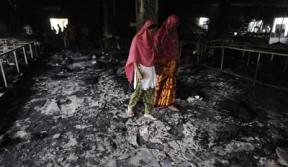By Lisa Leff
SAN FRANCISCO - San Francisco supervisors unanimously
approved a new law Tuesday that requires city contractors
to guarantee in writing that the uniforms, computers and
other goods they supply were not made by workers exploited
in so-called "sweatshops."
By signing the "sweat-free code of conduct," manufacturers
and wholesalers that do business with the city would be
promising that their workers are paid the local minimum
wage, have the right to unionize and enjoy safe working
conditions. The pledge also vouches that no child labor,
foreign convict or slave labor was used to produce the
merchandise that winds up in San Francisco hospitals, fire
stations and City Hall offices.
The cities of Los Angeles, Milwaukee, Newark, N.J. and
Albuquerque, N.M., already have anti-sweatshop laws on the
books. But Valerie Orth, who campaigned for the ordinance
as part of the international human rights group Global
Exchange, said San Francisco's law goes the furthest
because it includes an initial $100,000 for enforcement
and a stricter definition of what constitutes a sweatshop.
Companies with one major violation of the conduct code
would be disqualified from future contracts.
The purpose of the pledge is not to force the city to
switch contractors, but to use the municipal government's
$600 million in purchasing power to effect change at
existing factories, according to Orth.
"All of this is going to rest on a test case," she said.
"Once we find a company that signs the code of conduct and
then violates it by say hiring a subcontractor in Honduras
where the union is busted, the city of San Francisco can
say, 'You signed this code ... you have to let the workers
organize."
The law, introduced by Supervisor Tom Ammiano and Mayor
Gavin Newsom, is scheduled to take effect in 90 days.
During its first year, it will only apply to the garment
industry, such as contractors who supply uniforms, sheets
and towels. An advisory committee will decide what
category of contractors to target next.
As part of the registration process, contractors who sign
the sweatshop-free pledge would have to disclose the names
of their subcontractors, where their factories and located
and what workers are paid.
Randall Harris, executive director the garment industry
trade group San Francisco Fashion Industries, said that
out of the fewer than 200 companies producing apparel in
San Francisco, none are under city contract. Harris said
he nonetheless opposed the ordinance because he thinks it
puts the industry in a bad light.
"We need support in the city and county for the industry
we have left here," he said. "We don't need the city of
San Francisco perpetuating a belief that our industry is
somehow dirty. We have worked very hard to clean it up."
